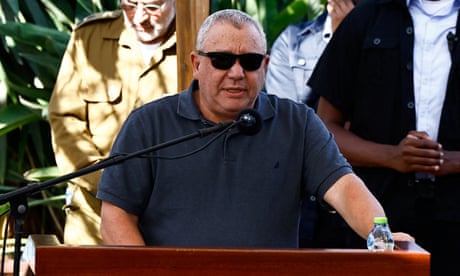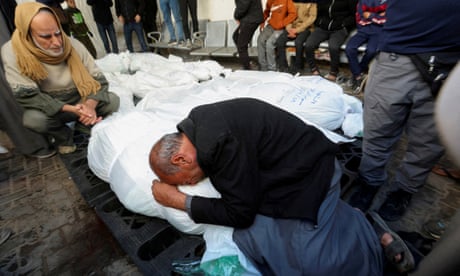Joe Biden has said that the creation of an independent state for Palestinians was not impossible while Benjamin Netanyahu was still in office, following a call with the Israeli prime minister on Friday.
The US president spoke with the Netanyahu for the first time in nearly a month about differences over a future Palestinian state, as well as Israel’s strikes in Gaza, where the Palestinian death toll has surpassed 24,000, according to local health authorities.
The US president said Netanyahu was not opposed to all two-state solutions, and there were a number of types possible.
The two leaders discussed efforts to secure the remaining hostages held by Hamas, and Israel’s shift to more “targeted” operations in Gaza to allow more humanitarian assistance to come through, the White House’s spokesperson John Kirby said after the call.
Kirby told reporters that Biden had been trying to schedule the call “for quite a bit of time” and denied it came in response to Netanyahu’s comment on Thursday saying he objected to Palestinian statehood that did not guarantee Israel’s security.

Friday’s phone call came one day after Netanyahu said that he had told US officials in plain terms that he will not support a Palestinian state as part of any postwar plan. Biden, for his part, in Friday’s call reaffirmed his commitment to work toward helping the Palestinians move toward statehood.
Asked if a two-state solution was impossible while Netanyahu was still in office, Biden said: “No, it’s not.”
Speaking to reporters after a meeting with US mayors, Biden said Netanyahu was not opposed to all two-state solutions, and there were a number of types possible, adding that some United Nations members do not have military forces.
Biden was asked if he would reconsider conditions on Israel aid given Netanyahu’s comments rejecting a two-state solution.
“I think we’ll be able to work something out … I think there’s ways in which this could work,” he said.
Biden and Netanyahu discussed efforts to secure the remaining hostages held by Hamas, and Israel’s shift to more “targeted” operations in Gazato allow more humanitarian assistance to come through, the White House said. Biden has been pressuring Israel to reduce Palestinian deaths even as he has maintained his strong support of Israel in its war against Hamas.
But the two men do not see eye-to-eye on Palestinians having a state, a solution Biden has advocated to achieve long-term peace.
“The president also discussed his vision for a more durable peace and security for Israel fully integrated within the region and a two state-solution with Israel’s security guaranteed,” the White House said in a statement about their call.
Biden’s call came as Red Crescent officials reported “intense gunfire from the Israeli drones targeting citizens at al-Amal hospital” in Khan Younis, the main city in the southern part of Gaza.
Israel launched a major new advance in Khan Younis this week to capture the city, which it says is now the primary base of Hamas fighters who attacked Israeli towns on 7 October, killing 1,200 people.
This week US senators defeated a measure that would have made US military aid conditional on an investigation into whether the Israeli government is violating human rights and international accords in Gaza. The measure signalled growing unease in Washington over the Israeli bombardment.
A Palestinian-American teenager was killed by Israeli security forces in the West Bank on Friday, Palestinian health officials said.
“We’re seriously concerned about these reports,” Kirby said.
Meanwhile in Yemen, the US military said its forces conducted strikes on Friday against three Houthi anti-ship missiles that were aimed into the southern Red Sea and were prepared to launch.
The missiles, in areas controlled by the Iran-backed militants, “presented an imminent threat to merchant vessels and the US Navy ships in the region”, the US central command posted on X (formerly Twitter), saying the missiles were destroyed.
The incident involving the Houthis, who say their attacks are in solidarity with Palestinians in Gaza, is the latest amid growing tensions in the Red Sea that have disrupted global trade and raised fears of supply bottlenecks.










































